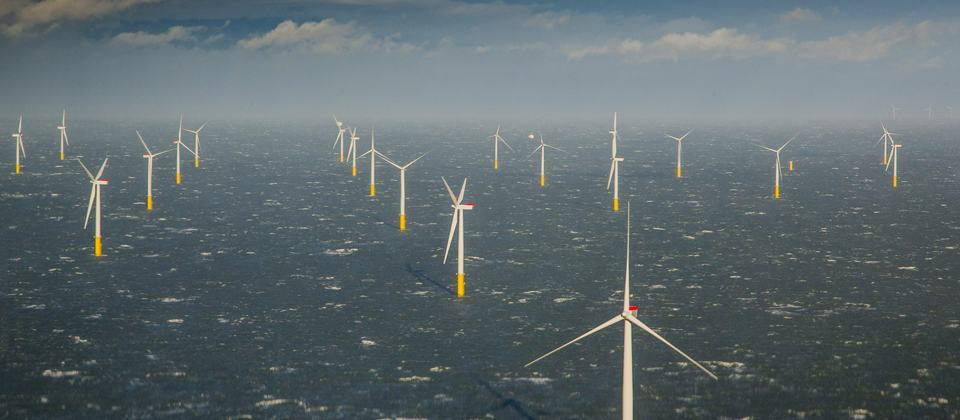Recently, I spoke with Belgium-based DEME Group’s CEO Alain Bernard to find out about why innovation is so important in a competitive B2B market. He talked specifically about the need for the offshore wind industry to facilitate true innovation through greater collaboration.
Belgian DEME Group is one of Europe’s largest marine engineering conglomerates. CEO Alain Bernard has seen it grow from a specialist dredging company into a highly diverse maritime business covering hydraulic projects, services to oil and gas companies, installation of offshore wind farms, environmental activities and more.
There’s no doubt that Alain Bernard is a great believer in renewables, so it’s not surprising this has been a focus area for the DEME Group in recent years. With strong roots in the maritime industry, based on its dredging history and capabilities, DEME has focused much of its attention and resources on renewable energy, in particular offshore wind.
Why do you see renewables as an opportunity?
In the beginning, it was a technological challenge developing solutions for renewable energy. But over the last years, I have become even more convinced that there is a huge opportunity in finding solutions for the major global challenges associated with reducing CO2 and other issues related to climate change. It’s a big issue, and also our politicians see it that way.
From the DEME Group’s perspective, we could see that our employees were motivated by challenges such as renewables. It’s much more than a technological challenge. If you want to find economical solutions for these kinds of problems, you need engineers, and we have 900 engineers in our company.
So finding viable solutions is key to DEME Group’s future?
It’s one of the keys. I’m a big believer in the future of renewables, especially offshore renewables. But we all have to make a huge effort to reduce the cost price. So I think that the offshore wind declaration signed by eleven major energy companies is a very positive move.
Reducing costs is a challenge, but perfectly feasible. This collaboration between these large players is great: everyone has to work together to get the price down.
What role does the DEME Group play in the development of renewables?
Our role is to innovate, create and find ever-smarter solutions. There are a lot of possibilities and we have a lot of ideas. But whatever the solution, it has to be affordable. Subsidies are commonplace, but they do not provide a good base for a profitable business. So we have to keep searching for competitive solutions in renewables.
We are working hard together with partners, and we’re investing a lot. We’re being disruptive, but we’re still only at 20 percent of our potential, so there’s still a lot of work to do.
How do you encourage innovation?
We develop a lot of ideas at the DEME Group. Every year, we have a competition in which we receive hundreds of ideas. We have a system for evaluating and select the best ideas, which includes developing a business case, where relevant. We are always working to develop vessels and technologies that will take the industry forward. Some projects have been backed by the Flemish government, which has provided subsidies.
What are the major barriers to progress?
One of the barriers is the dependence on subsidies. Generating electricity from renewables is expensive because it is new technology. Subsidies can be funded by taxes, but no-one wants to pay more tax! People like the idea of renewables, but they don’t want to pay for it. This is a problem.
In Europe, we have the 2020 plan to achieve affordable energy. In order for Belgium to achieve this, the country needs to increase the megawatts generated offshore, which will cost each household around 40 Euro per year. Perhaps it doesn’t seem like a lot, but people still need to be convinced. We have to convince them that it’s better for the future of the country.
Another technological challenge the industry needs to overcome is electricity storage. Batteries are ineffective on a large scale and expensive. This will require significant innovation.
How can the industry work together more efficiently for the greater good?
At DEME, we have been very focused on approaching developments through partnerships. We do not want to be overly protective. If we invent something, we will make it available to interested parties. By introducing the technology, we are giving ourselves a head start, but we also intend to contribute to the industry. I believe this is what is needed to accelerate the development of offshore wind.
Competitive behaviour is a natural part of business. If we look at technologies to reduce weather downtime, for example, each supplier will claim it has the best system. That’s understandable. But in the end, the only thing that counts is the end price. The best solution is the one that will drive down costs, and we need fair competition to determine the best. May the best technology win!
Can you explain the DEME Group’s basis for diversification, particularly into offshore renewables?
The essence is our speciality within certain niches and that we aim to be the best in those niches. Our dredging background has given us knowhow within different areas, such as the seabed, sea conditions and other marine environment factors as well as the associated technologies. We have specialised further in related niches, and without losing the focus of our core knowhow, we have expanded our activities.
One of these niches is offshore wind, which we moved into from a deep knowledge of dredging and installation of foundations. And from offshore wind, we are moving into other activities related to offshore renewables such as wave and tidal energy. We focus on certain disciplines where we can add value and where we can be leaders in our sector. That means having the people, equipment, financing and legal capabilities – everything you need to execute these kind of activities.
How can the DEME Group profit from this diversification?
You can do a lot to achieve turnover, but you have to be profitable. You can be a first mover, but as soon as you start a new activity, others will follow. So you have to keep on innovating, expanding core competencies and the business, while still earning money.
We currently deliver more than average returns to our shareholders. A lot of it comes from new technologies, new inventions and disruptive ideas that generate mutual benefits. But we also have to be smarter than others and differentiate. That means that we have to innovate, be cheaper, and be more effective every day. We won’t sleep until we do!
One example came from one of our innovation competitions, where we encourage people to come up with ideas for new inventions and technologies.
One of our 900 engineers wanted to find a solution for installing wind turbines in high winds. Offshore wind is a ‘contradictio in terminis’. There’s more wind offshore than onshore, so generating electricity offshore is a logical thing. But, on the other hand, there can be too much wind or heavy seas that makes things difficult, for example operating the cranes during installation of turbines.
So a colleague had an idea: a robot to automate turbine component installation. That was a very smart idea and the Flemish government thought so, too. We put up 50 percent of the funding for development and the PMV (Flemish Investment Fund) put up the other 50 percent.
For us, this goes part way to achieving the vision of reducing the cost price and making renewable energy more accessible to the world. But we won’t do this without encouraging innovation in our business.

